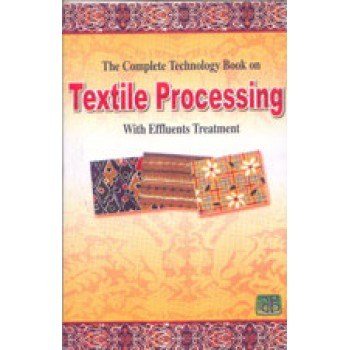The Complete Technology Book on Textile Processing with Effluent Treatment
| Price: | Rs.1,000.00 |
Detail Of The Complete Technology Book on Textile Processing with Effluent Treatment
| ISBN | 8178330504 |
| Pages | 584 |
| Language: | English |
| Product Code: | 1 |
| Size(in cm): | 21*13.5 cm |
| Weight(in grams): | 500(approx) |
Description:
Textile manufacturing is a major industry, it is based in the conversion of three types of fibre into yarn, then fabric, then textiles. These are then fabricated into clothes or other artefacts. Cotton remains the most important natural fibre, so is treated in depth. There are many variable processes available at the weaving and fabric forming stages coupled with the complexities of the finishing and colouration processes to the production of wide ranges of products. Certain other fiber properties increase its value and desirability in its intended end use but are not necessary properties essential to make a textile fiber. Such secondary properties include moisture absorption characteristics, fiber resiliency, abrasion resistance, density, luster, chemical resistance, thermal characteristics, and flammability. Some primary properties of textile fibers are: fiber length to width ratio, fiber uniformity, fiber strength and flexibility, fiber extensibility and elasticity, and fiber cohesiveness. Some, mostly larger, firms operate in the organized sector where firms must comply with numerous government labour and tax regulations. Most firms, however, operate in the small scale unorganized sector where regulations are less stringent and more easily evaded. The textile industry occupies a unique place in our country. One of the earliest to come into existence in India, it accounts for 14% of the total Industrial production, contributes to nearly 20% of the total exports. Being the largest foreign exchange earner, it accounts for more than 5 per cent of GDP.
This book majorly deals with characteristics of cotton textile processing, characteristics of effluents, characteristics and treatment of synthetic, textiles processing effluents, processes, volume and characteristics of effluents, treatment, the properties of textile fibres, important properties of fibres, basic aspects of textile fibres etc.
The book covers complete details of textile processing with the standard parameters of effluents treatment which is the burning problem for the textile processors. Needless to say that this book will be of immense use to textile processors, consultants and chemists engaged in water and waste water treatment, research institutions etc.
Reviews (0)
Write a review
Your Name:Your Review:
Note: HTML is not translated!
Rating: Bad Good
Enter the code in the box below:



 |
| 